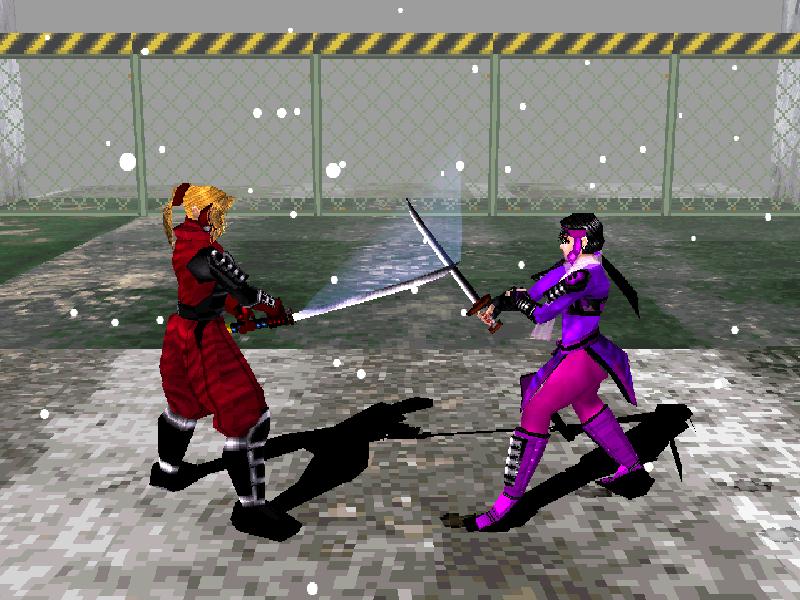100 Deaths is Robert Florence’s exploration of 100 deaths across 100 games, and what they might mean in the grander scheme.
I am going to die 100 Deaths.
Videos by VICE
In Japanese Noh theater, stillness is essential. The performers are trained to make the slightest movement reverberate like thunder. They are dressed in robes that hide their shape, so that as joints bend and rotate, the effect is lessened. Their faces are obscured by masks that are animated purely by theatrical light. The head is tilted this way, and it is a frown. The head is tilted the other, and it is a smile.
Movement, when it comes, is a shuffle. The feet, wrapped in tabi, white socks, are the key element of the performers relationship with the stage. Noh performers train for years to establish the perfect motion across the floor. Their vision is obstructed, and the four corner columns of the Noh theater stage are used to help them navigate and orientate themselves.
My eyes open to cherry blossoms.
I have a sword in my hand. A Japanese sword, centuries old. Across from me, another performer is standing, waiting for me to come to my senses. I am dressed in the most beautiful fabric, and I am loathe to make it ripple and move. Stillness is all around me.
To my ears, there is nothing but the sound of the wind and the song of nature. My opponent stares, his own sword held firmly before him in a low stance.
We are inside a performance space that offers us a restricted view of our universe. There is me, and there is him. There are cherry blossoms. There are our swords, and our beautiful fabrics. And then there are the edges of our reality. This life, within this world, has borders. Outside these borders, I understand, is an audience.
Our audience is this:
A 20-year-old man, in his bedroom. Still in his parents’ home. His bedroom is noisy with chatter. There is the smell of Indian takeaway. There is the low crackle and fizz of Irn-Bru. This young man is sitting on a bed with a device in his hand—a device that connects to the stage we are standing on. Another, younger man, sits with him. He holds a device too. Both men are smiling, chattering. I can’t hear them.
Into the room comes a woman. She is in her early 60s. She speaks to the young man, and he smiles. I understand that she is his mother. I know because I can see how they look at each other. I can see that they look at each other with—
My opponent moves.
It is nothing more than a shift. A slide forward in the performance space. His face is a mask, it tells me nothing. But he has moved forward an inch, and that tiny change in this universe is like a flock of birds exploding from a tree.

In Noh theater, the beat of the kotsuzumi drum accompanies the performer, supporting and anticipating his decisions. Here, I feel my heart beat, and I raise my sword to a more defensive position. It is a motion that brings the world back to an apprehensive stillness. My opponent waits, again. There is no rush to the curtain call in this performance.
The audience is enthralled.
The woman, the mother, leaves now.
And I need you to understand that this audience is much larger than you might think. This audience sits in a theater of memory, and the footprint of that building is huge indeed. We follow this mother downstairs to a sitting room. There, the young man’s father is sitting on a chair by the TV. He is most likely smiling. He most often was. It is a Friday night, and all is well in the world. The mother and father speak to each other, about something.
We will never know of what they speak, because the young man chose to be upstairs, participating in a kind of theater.
And he is me.
And that was okay then, and it must be okay now.
Then, it was a Friday night, and all was well in the world, and everyone was still alive.
I am still alive.
My opponent remains locked in place, cherry blossoms falling behind him, an aura of pink. This time it is me who moves. My feet caress the stage floor as I step-step-step towards my rival. He shifts, back a little, lowering his sword. Movement is everything now. But it is all our feet. Our faces remain masks. Our swords move hardly at all. But our feet—they are the crash of a waterfall. They are a burst of tears.
It is quick when it happens.
His sword moves once and dashes against my throat. Blossoms of blood rise like fireworks from my neck. It is beautiful. It is theater.
The audience reacts.
A cry of joy from one. A roar of defeat from the other. Laughter.
If you were in that house, standing still on the staircase outside that room, you would hear that laughter. And from the sitting room below, you would hear the television and the voices of a mother and father.
You may want to stand there, quite still, for a very long time.
More
From VICE
-

Screenshot: Xbox Game Studios -

Screenshots: Bethesda Softworks -

Screenshot: Shaun Cichacki -

Collage by VICE
